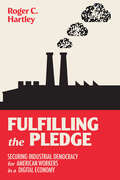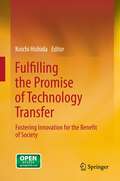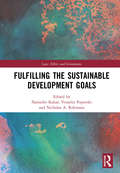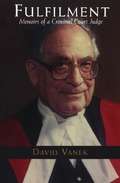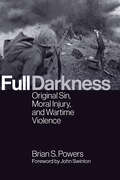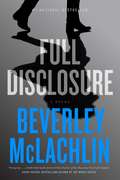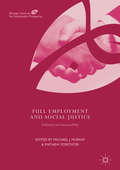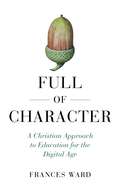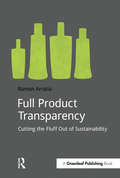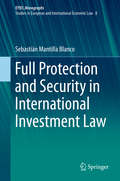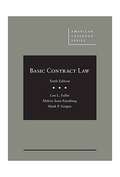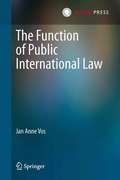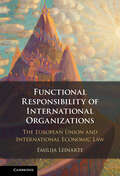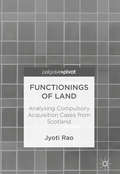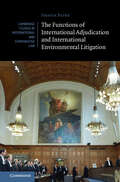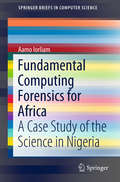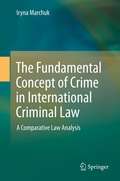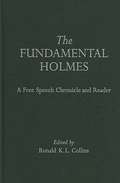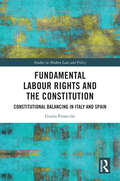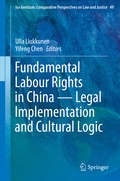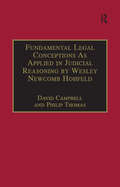- Table View
- List View
Fulfilling the Pledge: Securing Industrial Democracy for American Workers in a Digital Economy
by Roger C. HartleyAn insightful and evidence-based assessment of our urgent need to enact labor law reform—and how to achieve it.Millions of non-union workers want unionization, but our current labor-management relations law conspires to deny them meaningful opportunities to secure collective workplace representation. The resulting low rates of collective bargaining impose economic, political, and social costs on us all. In Fulfilling the Pledge, Roger Hartley addresses the plight of American workers, who face a grim, uncertain future, as the digital workplace reshapes the hierarchical post–World War II industrial relations system that once gave workers a voice. Through empirical evidence and the lens of law and policy, Hartley examines what industrial sociologists call the chronic &“representation gap&” and clarifies how a wide-ranging movement could build a vocal constituency for the congressional enactment of labor law reform.The pledge made in the 1935 National Labor Relations Act to encourage establishment of industrial democracy—where workers possess a voice in their places of work—remains unfulfilled. Speaking to policymakers, scholars, historians, and the average citizen, Fulfilling the Pledge makes a compelling case for collective workplace representation that serves the greater good, even as American labor relations law continues to undermine collective bargaining by workers and becomes an increasingly significant political and social issue.
Fulfilling the Promise of Technology Transfer: Fostering Innovation for the Benefit of Society
by Koichi HishidaUniversities and research institutes are increasingly expected to contribute to society by creating innovation from the returns of their research results and the establishment of new technologies. Toward that goal, Keio University in Japan held an international symposium titled "Fulfilling the Promise of Technology Transfer: Fostering Innovation for the Benefit of Society." From that symposium the following contents are included in the present volume: 1) A showcase of ideas and case studies to promote future creation of innovation by universities and research institutes worldwide, including information on the R&D value chain, licensing, income generation, start-ups and mechanisms to encourage entrepreneurship, and the changing role of universities in fostering innovation. 2) Introduction of active research projects that aim to productize successful research results on an international level. For example, the book includes results of research on stem cell technologies and regenerative medicine as well as the realization and application of polymer photonics and the development of the core technology of polymer photonics. 3) Case studies from the U.K. in developing industry-academia collaboration with various business partners ranging from start-ups and spinout companies to large enterprises. 4) Reports of the achievements of the technological transfer activities at Keio University supported by the 5-year public fund, with suggestions for future prospects.
Fulfilling the Sustainable Development Goals: On a Quest for a Sustainable World (Law, Ethics and Governance)
by Narinder Kakar, Vesselin Popovski and Nicolas A. RobinsonThis book contains assessment of the progress, or the lack of it, in implementing the UN Sustainable Development Goals (SDGs). Through review of the assessments and of case studies, readers can draw lessons from the actions that could work to positively address the goals. The 2030 Agenda for Sustainable Development is designed to catalyze action in critical areas of importance to humanity and the planet. The effort to implement the SDGs, however, demands a sense of urgency in the face of environmental degradation, climate change, emerging conflicts, and growing inequality, among a number of other socio-economic problems. Five years after the launch of the 2030 Agenda, this book takes stock of how far the world has come and how we can position ourselves to achieve the global targets. The book is one of the first to assess how the implementation is impeded by the onset of COVID-19. It contains a special chapter on COVID-19 and the SDGs, while many thematic chapters on different SDGs also assess how COVID-19 adversely affects implementation, and what measures could be taken to minimize the adverse effects. This publication thus provides a fresh look at implementation of the SDGs highlighting impactful and creative actions that go beyond the business-as-usual development efforts. The volume reinforces this analysis with expert recommendations on how to support implementation efforts and achieve the SDGs through international and national strategies and the involvement of both the public and private sectors. The result is an indispensable textual tool for policy makers, academia, intergovernmental organizations (IGOs) and non-governmental organizations (NGOs), as well as the public, as we march toward the 2030 deadline.
Fulfilment: Memoirs of a Criminal Court Judge
by David VanekSoldier, university professor, lawyer, political candidate, and judge; David Vanek’s compelling life story has seen him in many roles, all of which are played out in these memoirs. The child of Jewish-Russian immigrants, Vanek encountered anti-semitism while growing up, but was able to overcome prejudice and rise to prominence. He was educated at the University of Toronto and Osgoode Hall Law School (where he was in a Jewish fraternity with Johnny Wayne and Frank Shuster) before serving in the Second World War. When the war was over, he returned to the University of Toronto to teach law, and opened his own practice. In 1963 he ran for Parliament as a member of the Progressive Conservative party. In 1968 Vanek became a provincial court judge, and would preside over cases dealing with robbery, drugs, assault, gambling, pollution, and embezzlement, as well as the rights of citizens vs. the rights of police. His most high-profile case was that of Susan Nelles, a nurse at Toronto’s Hospital for Sick Children who was charged with the murders of four babies at the hospital. Vanek went on to become the president of the Provincial Court Judges Association, and was active in campaigning for changes in how the courts treat young offenders.
Full Darkness: Original Sin, Moral Injury, and Wartime Violence
by Brian S. PowersA theological treatment of war, trauma, and the fundamental character of human existence In Full Darkness theologian and wartime veteran Brian Powers argues that the Augustinian concept of original sin can illuminate the nature of wartime violence, particularly through the lens of veteran trauma. He shows precisely how sin and war both cause human identity, agency, and hope to be lost.Powers explores sin as a pathogenic disfigurement that shapes cultural values and ethical ideas, frequently resulting in moral injury. Combat veterans experience a humanity deprived of grace and are devoured by the forces of war, often suffering post-traumatic stress disorder. But Powers provides a ray of hope and a path towards healing.Ideal for veterans, chaplains, and pastors, Full Darkness offers a new perspective on the cultural understanding of military violence, provides theological help for those drowning in guilt and shame, and paves the way for reclaiming positive human agency and identity.
Full Darkness: Original Sin, Moral Injury, and Wartime Violence
by John Swinton Brian S. PowersA theological treatment of war, trauma, and the fundamental character of human existence In Full Darkness theologian and wartime veteran Brian Powers argues that the Augustinian concept of original sin can illuminate the nature of wartime violence, particularly through the lens of veteran trauma. He shows precisely how sin and war both cause human identity, agency, and hope to be lost.Powers explores sin as a pathogenic disfigurement that shapes cultural values and ethical ideas, frequently resulting in moral injury. Combat veterans experience a humanity deprived of grace and are devoured by the forces of war, often suffering post-traumatic stress disorder. But Powers provides a ray of hope and a path towards healing.Ideal for veterans, chaplains, and pastors, Full Darkness offers a new perspective on the cultural understanding of military violence, provides theological help for those drowning in guilt and shame, and paves the way for reclaiming positive human agency and identity.
Full Disclosure
by Stormy Daniels Michael AvenattiInstant New York Times bestseller"Standing up to bullies is my kind of thing."How did Stormy Daniels become the woman willing to take on a president? In this book, Stormy Daniels tells her whole story for the first time: what it's like to be a leading actress and director in the adult film business, the full truth about her journey from a rough childhood in Louisiana onto the national stage, and everything about her interaction with Donald Trump that led to the nondisclosure agreement and the behind-the-scenes attempts to intimidate her.Stormy is funny, sharp, warm, and impassioned by turns. Her story is a thoroughly American one, of a girl who loved reading and horses and who understood from a very young age what she wanted?and who also knew she'd have to get every step of the way there on her own.People can't stop talking about Stormy Daniels. And they won't be able to stop talking about her fresh, surprising, completely candid, nothing-held-back book.
Full Disclosure: A Novel (A Jilly Truitt Novel)
by Beverley McLachlinFrom the former Chief Justice of Canada comes a riveting thriller starring Jilly Truitt, a rising, young defense attorney faced with a case that hits close to home. A searing look at what justice means in the courts and on the streets, Full Disclosure is perfect for fans of Kathy Reichs, Louise Penny, and Lisa Scottoline.When everyone has something to hide, the truth is the only defense. There’s nothing Jilly Truitt likes more than winning a case, especially against her former mentor, prosecutor Cy Kenge. Jilly has baggage, the residue of a dark time in a series of foster homes, but that’s in the past. Now she’s building her own criminal defense firm and making a name for herself as a tough-as-nails lawyer willing to take risks in the courtroom. When the affluent and enigmatic Vincent Trussardi is accused of his wife Laura’s murder, Jilly agrees to defend him, despite predictions that the case is a sure loser and warnings from those close to her to stay away from the Trussardi family. Determined to prove everyone wrong, Jilly investigates Laura’s death, hoping to discover a shred of evidence that might give the jury a reasonable doubt. Instead, she is confronted by damning evidence and uncooperative witnesses at every turn. Someone isn’t telling the truth, but who? With her reputation and Vincent’s life on the line, Jilly tries to unravel the web of secrets surrounding Laura’s murder. As she digs deeper, she uncovers a startling revelation that will change not only the case, but her life forever. From the gritty streets of Vancouver to the fateful halls of justice, Full Disclosure is a razor-sharp thriller that pulses with authenticity and intrigue.
Full Employment and Social Justice
by Michael J. Murray Mathew ForstaterThis edited collection investigates how full employment programs can sustain the economy and the environment, promote social justice, and reinvigorate local communities. The contributing authors focus on the formation of institutions to eliminate the opportunity gap for marginalized populations, enact environmentally sustainable methods of production and consumption, and rebuild local economies through education, training, and community redevelopment programs. They argue that the formation and implementation of a federally funded, locally operated Job Guarantee program is a vital component to address a variety of complex and interweaving concerns. Through the formation of alternative institutions and encouraging local economies, the Job Guarantee approach has the potential to alter economic, social, and political structures away from an exploitative market-oriented structure toward one that is refocused on humanity and the sustainability of the earth and its peoples, cultures, and communities.
Full of Character: A Christian Approach to Education for the Digital Age
by Frances WardEngaging with current philosophers and thinkers, this book looks at what are the roots to our human condition. It looks the wisdom that traditional Christianity can bring to a Western culture preoccupied with post-truth, individualism and utilitarian methods of thinking. <P><P> The desire for a fulfilling life is a common motivation to people, regardless of religious faith or non-faith. To be full of character - joyful, thoughtful, resourceful and truthful - we need habits of the heart. This book will explore the ways in which we can imagine our humanity differently, and find happiness as a direct result of becoming full of character.
Full Product Transparency: Cutting the Fluff Out of Sustainability (Doshorts Ser.)
by Ramon ArratiaThis book outlines a path towards a more practical era for "corporate responsibility", where companies make real environmental gains based on hard facts, using lifecycle assessment (LCA) and environmental product declarations (EPDs).By the time you have finished this book you will be able to make the case for moving from corporate to product sustainability and propose a methodology for doing this, based on EPDs.In the past decade, thousands of companies have started the journey towards sustainability, leading to a huge supporting industry of sustainability professionals, lorry-loads of corporate reports, and a plethora of green labels and marketing claims. Ramon Arratia argues that it's now time to transform this new industry by cutting out all the fluff and instead focusing on Full Product Transparency (FPT). In the world of FPT, companies carry out LCAs for all their products and services, identifying their biggest impacts and where they can make the greatest difference. They disclose the full environmental impacts of their products using easily-understood metrics, allowing customers to make meaningful comparisons in their purchasing decisions and providing governments with a platform to reward products and services with the lowest impacts.This book will help you put your company on a path towards Full Product Transparency. This is a decision that can revolutionize and align consumer behaviour, supply chains, policy-making and reporting. It is no less than the path to the future of all business.
Full Protection and Security in International Investment Law (European Yearbook of International Economic Law #8)
by Sebastián Mantilla BlancoThis book provides a comprehensive study of the standard of ‘full protection and security’ (FPS) in international investment law. Ever since the Germany-Pakistan BIT of 1959, almost every investment agreement has included an FPS clause. FPS claims refer to the most diverse factual settings, from terrorist attacks to measures concerning concession contracts. Still, the FPS standard has received far less scholarly attention than other obligations under international investment law. Filling that gap, this study examines the evolution of FPS from its medieval roots to the modern age, delimits the scope of FPS in customary international law, and analyzes the relationship between FPS and the concept of due diligence in the law of state responsibility. It additionally explores the interpretation and application of FPS clauses, drawing particular attention to the diverse wording used in investment treaties, the role ascribed to custom, and the interplay between FPS and other treaty-based standards. Besides delivering a detailed analysis of the FPS standard, this book also serves as a guide to the relevant sources, providing an overview of numerous legal instruments, examples of state practice, arbitral decisions, and related academic publications about the standard.
Fuller, Eisenberg, and Gergen's Basic Contract Law
by Lon L. Fuller Melvin A. Eisenberg Mark P. GergenThe Tenth Edition continues the approach of earlier editions in emphasizing rich, full-bodied versions of the principal cases, a functionalist approach to the problems of contract law, and analytical notes on such issues as the differences between classical and modern contract law and the role of the limits of cognition in contract law. The new edition includes a great number of new principal cases and case notes, including new materials on consideration, duress, remedies, interpretation, indefiniteness, the statute of frauds, electronic contracting, "browse wrap agreements," and unilateral mistake.
The Function of Public International Law
by Jan Anne VosThis book addresses fundamental aspects of the concept of public international law in both theory and practice. The argument developed by the author is that, underlying the traditional, horizontal, structure of public international law, a vertical structure of the concept of law may be discerned. This vertical structure is seen unfolding into two, mutually exclusive, frameworks: a framework of obligation, accounting for obligations, and a framework of authorization, accounting for rights. The problem then arising is that a concept of public international law which only admits either rights or obligations cannot be regarded as coherent. The author, however, takes and substantiates the position that coherence can be achieved by suppressing the mutual exclusivity of both frameworks. This move paves the way to formulating the function of public international law in terms of the constituting of international society. Since in public international law the theoretical aspects profoundly affect practice, this book is not only of interest to academics, but also for practitioners, such as officials of foreign offices and international institutions.
The Function of Public International Law
by Jan Anne VosThis book addresses fundamental aspects of the concept of public international law in both theory and practice. The argument developed by the author is that, underlying the traditional, horizontal, structure of public international law, a vertical structure of the concept of law may be discerned. This vertical structure is seen unfolding into two, mutually exclusive, frameworks: a framework of obligation, accounting for obligations, and a framework of authorization, accounting for rights. The problem then arising is that a concept of public international law which only admits either rights or obligations cannot be regarded as coherent. The author, however, takes and substantiates the position that coherence can be achieved by suppressing the mutual exclusivity of both frameworks. This move paves the way to formulating the function of public international law in terms of the constituting of international society. Since in public international law the theoretical aspects profoundly affect practice, this book is not only of interest to academics, but also for practitioners, such as officials of foreign offices and international institutions.
Functional Responsibility of International Organisations: The European Union and International Economic Law
by Emilija LeinarteThis book provides a novel approach to the allocation of international responsibility in a multilayered structure like the European Union. Introducing a new concept of functional international responsibility, this study finds that in international economic law the focus of international dispute settlement bodies is not on the responsible party, but on a party best placed to bear responsibility. The book offers a comprehensive analysis of international rules of responsibility and international dispute settlement practice, primarily that of the World Trade Organization and investment arbitration. The study offers a practically applicable approach to questions of international responsibility which will assist international adjudicators, EU and Member States' officials and third country government agents who negotiate economic agreements and are involved in international economic disputes. The book is also relevant to those interested in the governance and accountability questions under the new EU-UK Trade and Cooperation Agreement.
Functionings of Land: Analysing Compulsory Acquisition Cases from Scotland
by Jyoti RaoThis book focuses on the 'functionings' and capabilities generated from land by their owners and the challenge in satisfactorily recreating these through the compensation paid in the case of compulsory acquisition of private land. These discussions initiate a new debate on the insufficiency of existing approaches to compensation that are ignorant of the losses of ‘capabilities’ and ‘functionings’. The relationship between land, ownership and well-being of an individual is explained through the identification of various ‘functionings’ associated with the ownership of land in the context of Scotland. Contemporary approaches to compensation, founded on the utilitarian argument, have led to dissatisfactory outcomes for the affected landowners. Discussions in this book shift the focus to equalizing the share of burdens and benefits for each individual member of the society, through equalization of human capabilities. This book will be of value to development economists, researchers, policy makers and law makers concerned with compulsory acquisition of land.
Functions: From Organisms to Artefacts (History, Philosophy and Theory of the Life Sciences #32)
by Jean Gayon Armand De Ricqlès Antoine C. DussaultThis book, originally published in French, examines the philosophical debates on functions over the last forty years and proposes new ways of analysis. Pervasive throughout the life sciences, the concept of function has the air of an epistemological scandal: ascribing a function to a biological structure or process amounts to suggesting that it is explained by its effects. This book confronts the debates on function with the use of the notion in a wide range of disciplines, such as biology, psychology, and medicine. It also raises the question of whether this notion, which is as old in the history of technology as it is in the life sciences, has the same meaning in these two domains.
The Functions of International Adjudication and International Environmental Litigation (Cambridge Studies in International and Comparative Law)
by Joshua PaineThis book uses environmental disputes as a focus to develop a novel comparative analysis of the functions of international adjudication. Paine focuses on three challenges confronting international tribunals: managing change in applicable legal norms or relevant facts, determining the appropriate standard and method of review when scrutinising State conduct for compliance with international obligations, and contributing to wider processes of dispute settlement. The book compares how tribunals manage these challenges across four key sites of international adjudication: adjudication in the World Trade Organization and under the United Nations Convention on the Law of the Sea, International Court of Justice litigation, and investment treaty arbitration. It shows that while international tribunals perform several key functions in the contemporary international legal order, they are subject to significant constraints. Paine makes a genuine addition to literature on the role of international adjudication in international law which will benefit academics, practitioners, and policymakers.
Fundamental Computing Forensics for Africa: A Case Study of the Science in Nigeria (SpringerBriefs in Computer Science)
by Aamo IorliamThis book presents a general introduction to the computational aspects of forensic science, covering the different tools needed for forensic investigations, the importance of forensics and biometrics, and the use of Benford’s law for biometrics and network traffic analysis. It specifically focuses on the application of these techniques in Africa, and how they can be of benefit in the investigation of crime in Nigeria in particular.
The Fundamental Concept of a Crime in International Criminal Law: A Comparative Law Analysis
by Iryna MarchukThis book examines the rapid development of the fundamental concept of a crime in international criminal law from a comparative law perspective. In this context, particular thought has been given to the catalyzing impact of the criminal law theory that has developed in major world legal systems upon the crystallization of the substantive part of international criminal law. This study offers a critical overview of international and domestic jurisprudence with regard to the construal of the concept of a crime (actus reus, mens rea, defences, modes of liability) and exposes roots of confusion in international criminal law through a comprehensive comparative analysis of substantive criminal laws in selected legal jurisdictions.
The Fundamental Holmes
by Ronald K. CollinsNo figure stands taller in the world of First Amendment law than Oliver Wendell Holmes, Jr. This is the first anthology of Justice Holmes's writings, speeches and opinions concerning freedom of expression. The book contains eight original essays designed to situate Holmes's works in historical and biographical context. The volume is enriched by extensive commentaries concerning its many entries, which consist of letters, speeches, book excerpts, articles, state court opinions and U.S. Supreme Court opinions. The edited materials - spanning Holmes's 1861-1864 service in the Civil War to his 1931 radio address to the nation - offer a unique view of the thoughts of the father of the modern First Amendment. The book's epilogue, which includes a major discovery about Holmes's impact on American statutory law, explores Holmes's free speech legacy. In the process, the reader comes to know Holmes and his jurisprudence of free speech as never before.
Fundamental Labour Rights and the Constitution: Constitutional Balancing in Italy and Spain (Studies in Modern Law and Policy)
by Giulia FrosecchiThis book reflects on constitutional balancing from the perspective of fundamental labour rights. It draws on neo-constitutional theories and builds on the assumption that fundamental labour rights, understood as rights aimed at protecting workers during their working life or after retirement, are the normative expression of founding values and can be balanced against equally axiological constitutional principles. The balancing of constitutional labour rights can be conducted by various institutional actors and by applying different techniques. This volume reviews the theoretical debates on judicial balancing and the approaches adopted by the Court of Justice of the European Union and the European Court of Human Rights, to proceed with a closer assessment of Italian and Spanish judicial traditions. In particular, it addresses the main profiles of the case law of the Italian and Spanish Constitutional Courts on labour and social law reforms adopted in the aftermath of the 2008 crisis, where balancing takes place between labour rights and economic principles. The analysis is focused on four main aspects: the fundamental labour rights in the balance; the role of the Courts; the technique applied by the Judges; and the constitutional interests subject to the balancing. It ultimately reveals that the axiological nature of fundamental labour rights is preserved and the economic and financial contingencies confirm their factual character, although they are occasionally recognised a prominent role in the ratio decidendi. The book will be a valuable resource for academics and researchers working in the areas of labour law, social security law, legal theory and constitutional law.
Fundamental Labour Rights in China - Legal Implementation and Cultural Logic
by Ulla Liukkunen Yifeng ChenThis volume gathers together chapters that address the theme of implementing fundamental labour rights in China. It explores the legal framework as well as key institutions and other actors along with the socio-economic context involved in interpretation, implementation, enforcement and overall promotion of fundamental labour rights in China. As a collection of chapters, it assembles comparative and mutually complementary perspectives and insights by distinguished scholars from China, Europe and the United States. With its broad perspective on implementation, the book discusses the most topical challenges to realizing fundamental labour rights in China. China was among the founding members of the ILO. With the regulatory approach of the ILO, fundamental labour rights have gained a new foothold as a key pillar in managing the social dimension of globalization. The development of fundamental labour rights protection in China can be viewed as part of a larger development within China's domestic economic and social transition as well as its integration into the global economic system. While China has ratified four of the eight ILO core conventions, the challenge of effective implementation and enforcement in the domestic context remains. With its in-depth research on fundamental labour rights in the particular cultural context of the Chinese experience, this book studies Chinese labour law from multiple perspectives, at the same time examining the wider role of international labour standards in developing Chinese law and society. This volume is a remarkable enlargement of existing scholarship on international labour standards, on the one hand, and fundamental labour rights in China on the other. These chapters thoroughly analyse the legal and institutional framework for implementing labour law in China. Among the topics covered are fundamental labour rights including freedom from forced labour, prohibition of use of child labour and non-discrimination. In addition, this volume benefits from socio-historical observations on the cultural logics that inform implementation of fundamental labour rights in China in which the history and current development of Chinese labour law are equally reflected with substantive depth.
Fundamental Legal Conceptions As Applied in Judicial Reasoning by Wesley Newcomb Hohfeld (Classical Jurisprudence Series)
by David Campbell Philip ThomasWesley Newcomb Hohfeld, born in 1879, died prematurely in 1918. He left only a few law journal articles as his published work. His 'Fundamental Legal Conceptions', originally published as two articles in the 'Yale Law Journal' for 1913 and 1917 and left incompletely revised at his death is, however, one of the principal foundations of analytic jurisprudence. The analysis of rights that Hohfeld offers is still regularly cited and relied upon by both lawyers and philosophers, and it is treated as a source of insight into the nature of moral rights as well as the legal rights that were Hohfeld’s own focus of concern. Although some of his analytical distinctions were anticipated by earlier jurists, their insights were fragmentary and imperfect by comparison. Hohfeld’s systematic and exhaustive (yet concise) treatment is generally regarded as unsurpassed. This is not to say that he has not been criticized, but his book forms the essential starting point for any discussion of the nature and structure of rights. 'Fundamental Legal Conceptions' has long been difficult to obtain. This new edition makes this classic of analytic jurisprudence available with a comprehensive introduction by Dr. N.E. Simmonds of Corpus Christi, University of Cambridge, UK.
